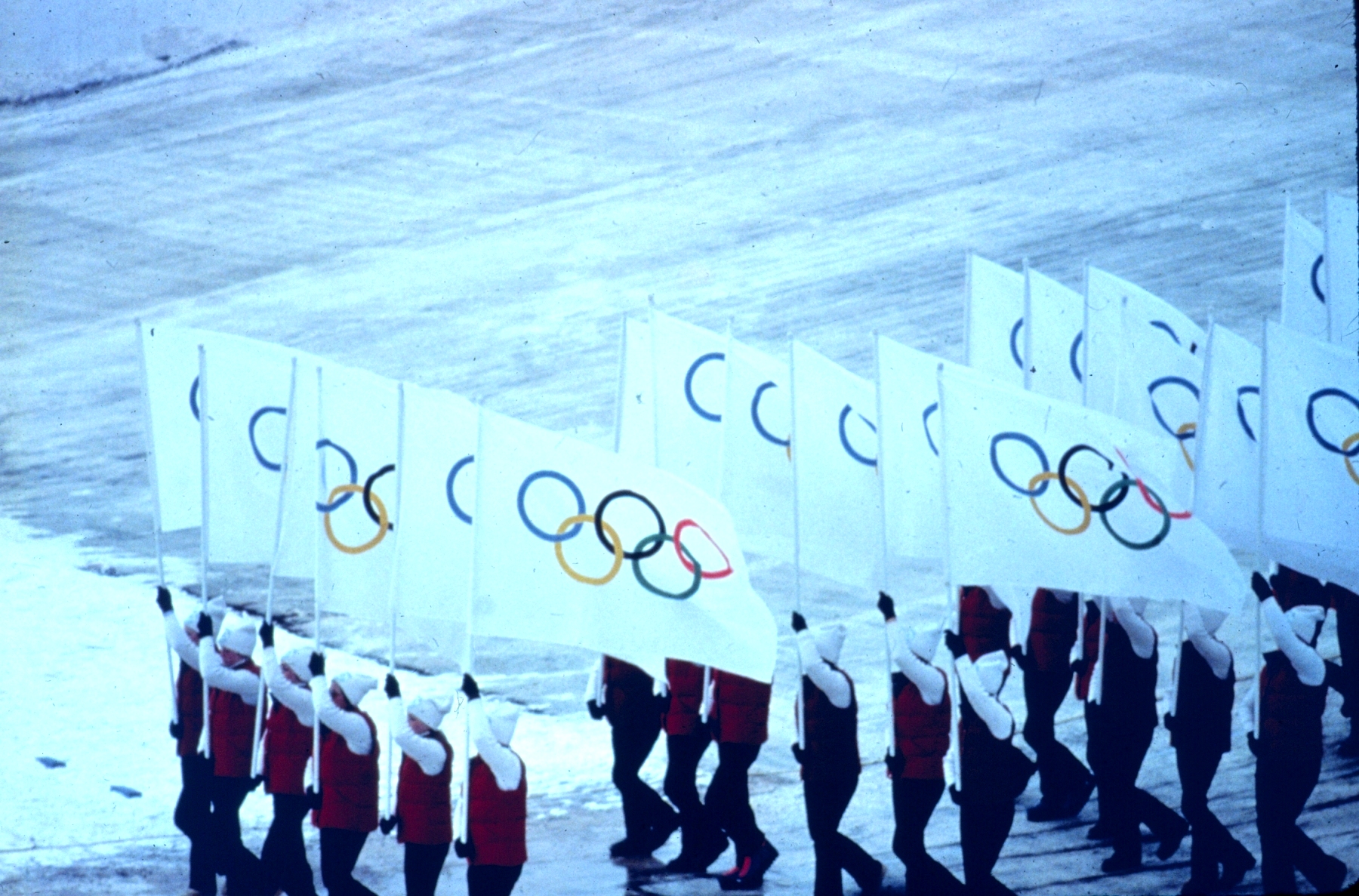
Olympic flags at the opening ceremony during the 1980 Winter Olympics in Lake Placid. Dr. John Kelley, NOAA/NOS/COOPS
All eyes are on the Korean peninsula as the 2018 Winter Olympic Games take place in PyeongChang in South Korea, only 50 miles from the border with North Korea. Athletes from both North and South Korea will march together at the opening ceremony, and will compete together on a unified women’s hockey team, perhaps providing an opening for greater engagement and peace.
We are bound to hear a lot about North Korea in the media coverage of the Games. How the media talks about North Korea can have a big impact on public opinion, but our research shows that the media has a poor track record of providing a full picture.
We have been tracking U.S. media coverage of North Korea. In over one-thousand news items over the course of 2016, one frame dominated coverage: Over three-quarters of news stories framed North Korea as a threat. Only two percent of news stories were framed proactively and recognized the need for engagement with North Korea. In 2017, the number of news stories on North Korea increased dramatically, with coverage continuing overwhelmingly to paint North Korea as a threat, and the second most common frame suggesting ambiguity and concern about President Trump’s comments and policies about North Korea. When we see the same alarming, and at times even cartoonish, story repeated over and over again in the news, we are missing crucial context—and it can begin to feel like positive change is not possible.
AFSC has been working in Korea for the past 65 years, and we believe that positive change is possible—if policymakers and the public support peaceful engagement. To build support for engagement, we need more accurate, less alarmist coverage of North Korea. So when you hear about North Korea in the news during the Olympic Games, here are three questions to ask.
Question #1: Why is the media focusing on fear?
Reporting on North Korea is challenging, and it can be hard for reporters to get accurate, timely information about the country and its people. As a result, the media tends to rely on orientalist stereotypes about North Korea, and to write off the whole country as “crazy.” The media has a bias toward the negative, and fear is a powerful messaging tool. These stories generate more clicks and get more attention than stories about ordinary people in North Korea leading ordinary lives. But by focusing on North Korea as a threat, the media helps build support for militarized and punitive policies like sanctions, and undermines support for appropriate humanitarian aid and diplomatic engagement.
Question #2: What am I missing?
Cartoonish stories about North Korea dominate news coverage, while the lives and humanitarian concerns of North Korean people go unseen. To fill in the gaps, check out the Instagram account @EverydayDPRK, and read the about the history of North Korea. The historian Bruce Cumings has shown that the United States has played a significant role in undermining peace on the Korean peninsula for more than half a century, from drawing the dividing line between north and south in 1945, to carpet bombing that used napalm during the Korean War, to introducing nuclear weapons there in 1958. The U.S. continues to station troops in Korea, a situation that has now persisted for more than 70 years.
There are small signs that engagement is possible, but these stories are underreported in the United States. In May 2017, for example, a U.N. Human Rights Council appointee made the first visit to North Korea, and in December 2017, a U.N. political affairs chief visited the DPRK and said the productive visit had left the “door ajar” for further engagement and peace. Neither story received much press attention in the U.S. While “sports diplomacy” may have a mixed track record, North Korea’s participation in the 2018 Winter Olympic Games could provide an opening for greater engagement.
Question #3: What can I do to support a more peaceful relationship between the U.S. and North Korea?
The prevalent "threat narrative" in the media has shaped public opinion, leaving Americans less optimistic that the situation can be resolved peacefully. But nearly 80 percent of the public still favors pursuing diplomatic efforts with the DPRK. That's good news, because AFSC—an organization that has worked on the Korean peninsula for over 65 years—supports engagement with North Korea as the key to building peace there. There are many opportunities to engage peacefully. AFSC believes that key steps include:
- Supporting humanitarian aid projects designed to meet basic needs for North Korea;
- Facilitating people-to-people exchanges;
- Reuniting Korean and Korean-American families; and
- Repatriating the remains of U.S. servicemen left in the DPRK after the Korean War.
To help build peace, you can:
- Download and share our new social media graphic calling for engagement with North Korea, using the hashtags #pyeongchang2018 and #WinterOlympics;

- On Twitter, follow @DJasper_, an AFSC expert on the DPRK who will be attending the opening ceremonies and tweeting his observations and reflections during the Games;
- Read and share our report on engaging North Korea; and
- Take action here! Tell Congress to open peaceful channels and to pursue diplomacy, not war, with North Korea.
As you watch the 2018 Winter Olympic Games, ask yourself why the media relies on a threat narrative when covering North Korea, what critical information and context is missing, and how you can help build peace. Take action here.